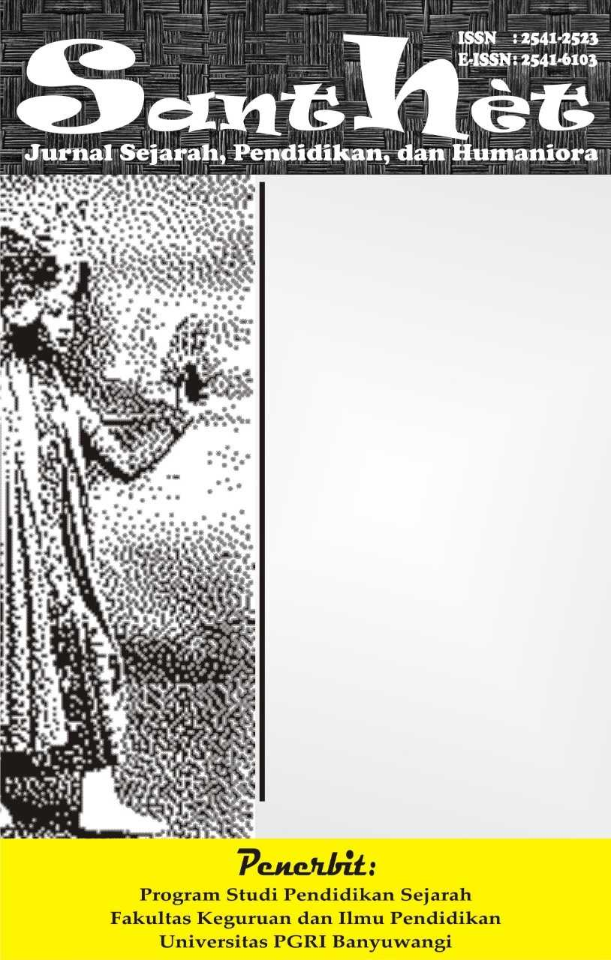NENA OZO WA'U TRADITION ON THE EVENT OF DEATH (Ethnographic Study of the Bhoanawa Muslim Community in Rukun Lima Village, Ende Selatan District) Ende Regency)
DOI:
https://doi.org/10.36526/santhet.v7i2.3202Keywords:
Tradition, Nena Ozo Wa'u, Bhoanawa peopleAbstract
The aim of this research is to determine the series of processes of the nena ozo wa'u tradition (death delivery) in the Bhoanawa Muslim community and to find out the meaning of the nena ozo wa'u tradition (death event) in the Bhoanawa Muslim community. The method in this research is the qualitative with observation, interview and documentation collection techniques. The results showed that the series of nena ozo wa'u events occurred on the third day after the day of death. The initial preparations for the bereaved family invited the Embu ka, religious leaders (mosque imams), funeral directors as well as family and neighbors. Before carrying out the nena ozo wa'u tradition, the event was preceded by a tahlilan prayer. Prayers are offered for the smooth passage and safety of the soul of the deceased to the afterlife. After the tahlilan prayer is over, the next event is nena ozo wa'u (preparing the equipment that must be taken out). The equipment was delivered to the house of the mosque imam and to the three houses of the caretaker or person who washed the body. 1). Firstly, the mothers who attended the event, began to select and separate the equipment sent by Ka embu such as sarongs (textiles), rice, detergent, bath soap, toothpaste, vegetables, fruit and other equipment available depending on the intentions and sincerity of the bereaved family. 2), sent four people to take them to the house of the mosque imam and the three houses of the caretaker of the body. 3). distributed to families, existing equipment including valuables, clothing or used items left by the deceased/deceased are distributed to families or people in need. The meanings contained in the nena ozo wa'u tradition include religious meaning, the meaning of friendship/brotherhood and the meaning of sharing.
References
Ansori ,Yoyo Zakaria, Indra Adi Budiman, Dede Salim Nahdi. 2019. Islam dan Pendidikan Multikultural. Jurnal Cakrawala Pendas Volume 5. Nomor 2
Aufa, Ari Abi . 2017. Memaknai Kematian Dalam Upacara Kematian di Jawa. An-Nas; Jurnal Humaniora Volume 1, Nomor 1
Djaya,Tika Ristia.2020. Makna Tradisi Thedak Siten Pada Masyarakat Kendal (Sebuah Analisis Fenomenalogis Alfred Schutz). Intelektiva : Jurnal Ekonomi,Sosial dan Humaniora volume 01 nomor 06.
Herimanto. (2012). Ilmu Sosial Dan Budaya Dasar. Jakarta Timur. Bumi Aksara
Kamus Besar Bahasa Indonesia (4th). 2013. PT. Gramedia Pustaka Utama
Koentjaraningrat (2002)Ilmu Antropologi. Jakarta: Rineka Cipta
Moleong, Lexy. (2010). Metode Penelitian Kualitatif. Bandung: PT Remaja Rosdakarya.
M. Nur ghufron,Riri Risnawati (2010).Teori-Teori Psikologi .Yogyakarta: Ar-Ruzz Media
Satyananda dkk. (2013). Kearifan Local Suku Helong. Yogyakarta: Ombak
Piotr Sztompka. (2004) Sosiologi Perubahan Sosial. Kencana : Jakarta
Rakhmat, Jalaludin. 2007. Psikologi komunikasi, bandung: Remaja Rosdakarya.
Thahir Andi. 2004. Hubungan Religiusitas dan Suasana Rumah Dengan Kecerdasan Emosional Pada Remaja Akhir, Tesis S2, Yogyakarta: Pasca Sarjana Universitas Muhammadiyah,Yogyakarta.





























